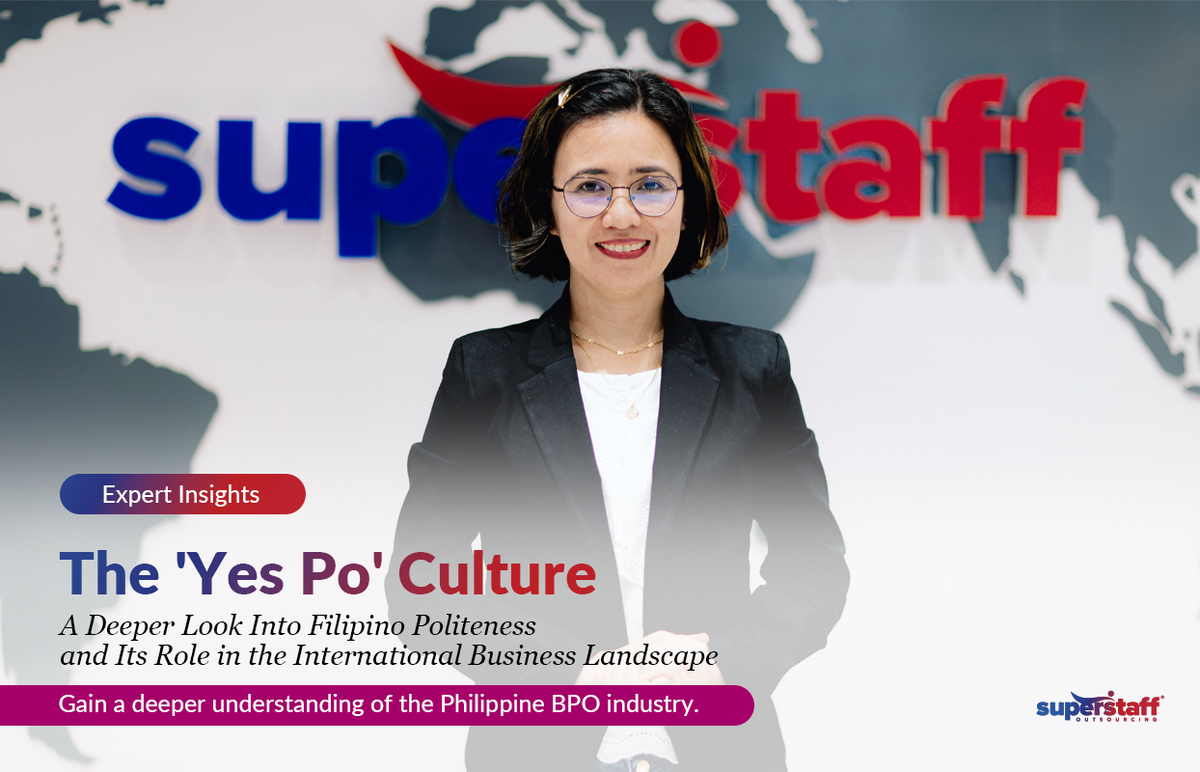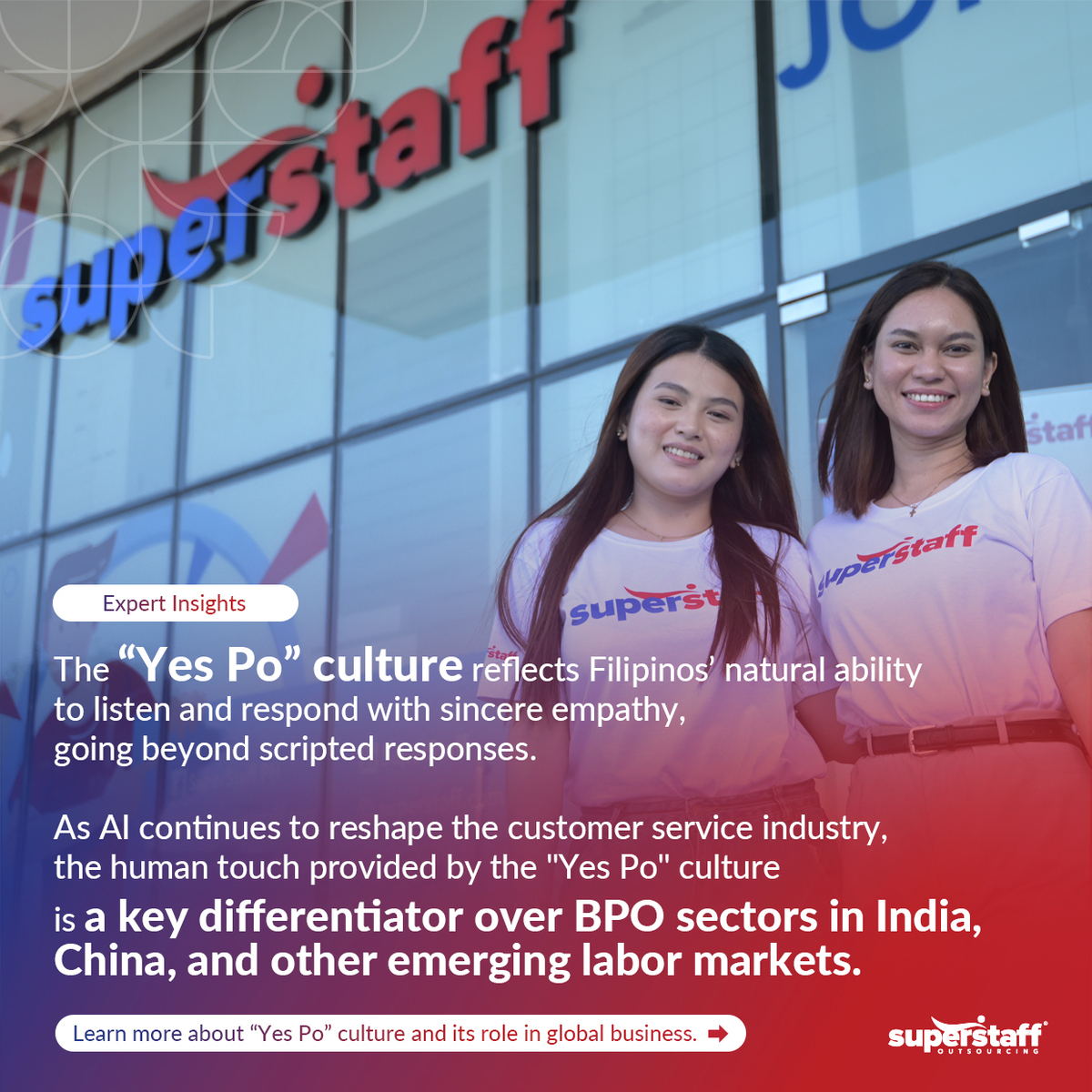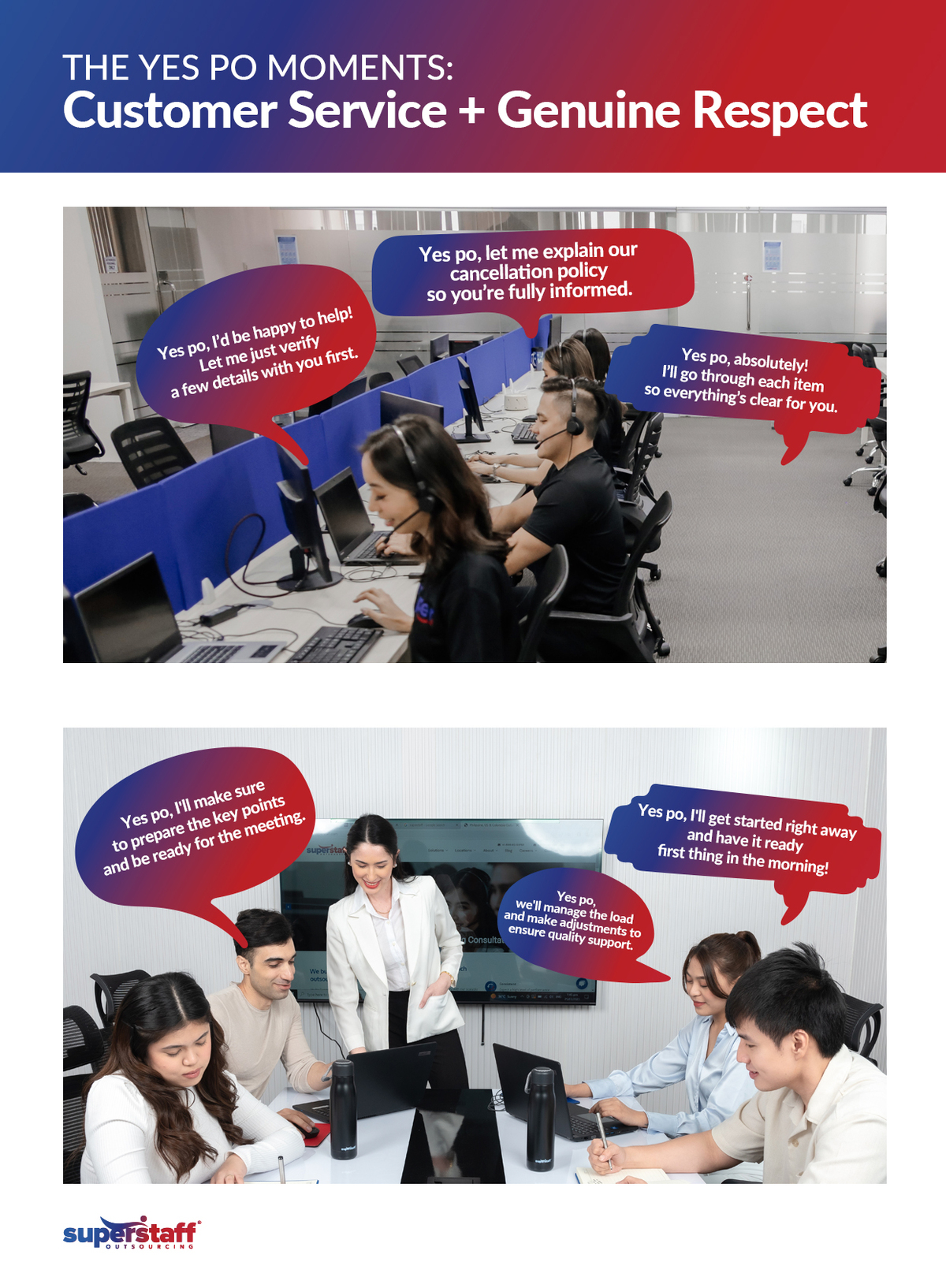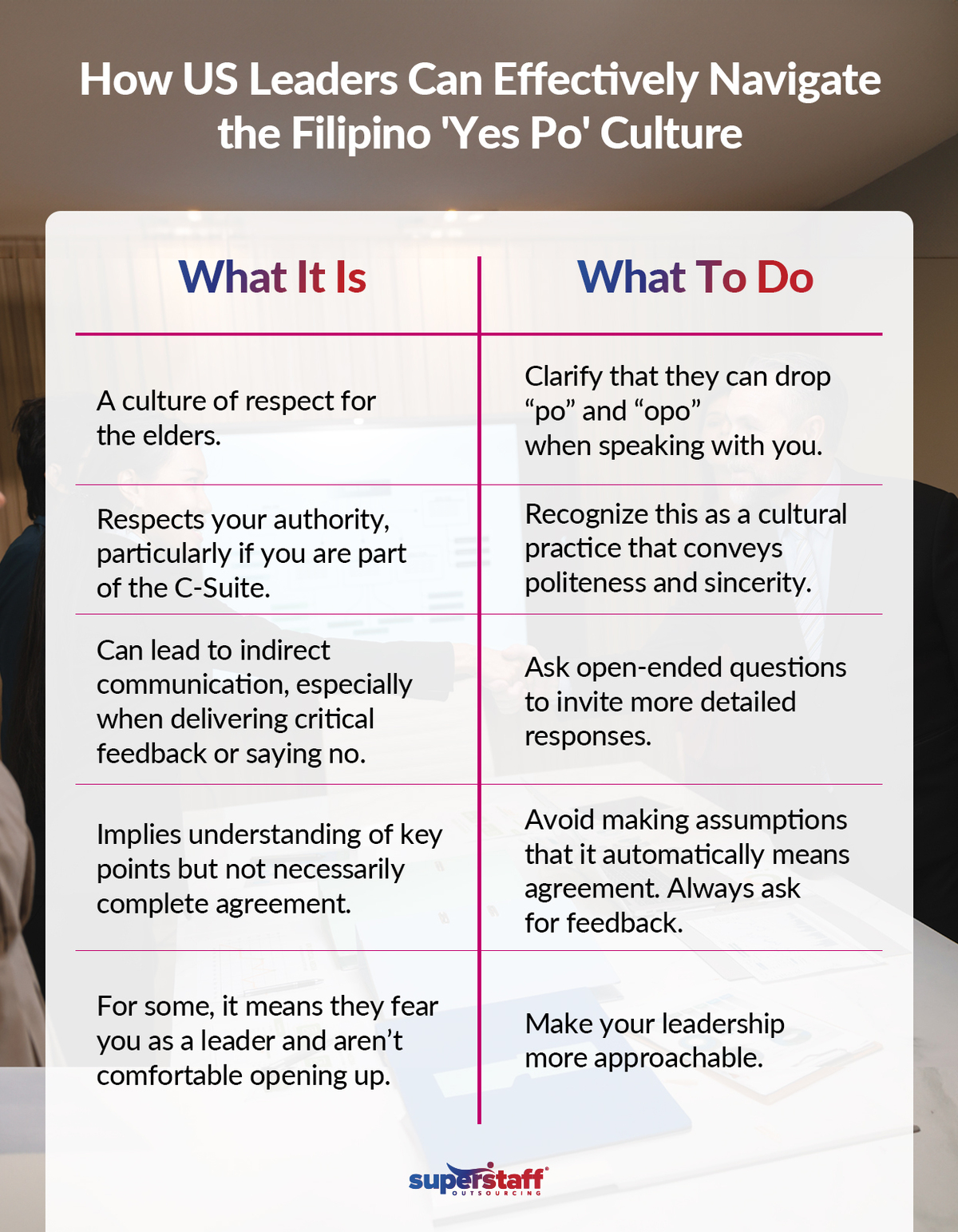
In international business, cultural nuances often determine the success or failure of a partnership. One such nuance in the BPO Philippines sector is the “Yes po” culture — a hallmark of Filipino politeness beyond simple courtesy. For businesses looking to expand their operations in the country, understanding this cultural trait is not just a matter of local etiquette; it’s a strategic advantage.
The “Yes po” culture, deeply ingrained in Filipino values of respect and deference, profoundly influences workplace interactions, from frontline customer service to high-level management. It signals a willingness to cooperate and a dedication to maintaining harmony and trust — two factors critical to long-term business success, especially within the BPO Philippines industry.
For decision-makers, recognizing this cultural phenomenon’s impact can enhance communication, improve team cohesion, and build stronger relationships, ultimately driving operational efficiency in an international setting. This blog looks deeper into how Filipino politeness plays a pivotal role in shaping a business culture that thrives on respect and collaboration.
Thinking of Working With a BPO Philippines? Here’s What You Should Know About ‘Yes Po’ Culture

Respect as a Social Foundation
In Filipino society, respect is a core value that permeates every aspect of life, extending seamlessly from family interactions to professional settings. Using “po” and “opo” in everyday language demonstrates a deep sense of deference to elders and authority figures, and this practice naturally transitions into the workplace. This respect-driven communication style shapes how Filipino professionals engage with colleagues and superiors, creating an atmosphere where hierarchy is acknowledged, and politeness is expected.
Professional Extension
This cultural respect doesn’t end at the office door. Filipino employees show the same courtesy to their managers and supervisors as they do to their elders at home. In the workplace, titles such as “sir,” “ma’am,” “TL” (Team Leader), or “OM” (Operating Manager) are commonly used in place of first names, reinforcing the importance of hierarchy and authority. This creates a unique dynamic where harmony and cooperation are prioritized, fostering loyalty and strong team cohesion.
Compared to Western business environments, where informal addresses and flat organizational structures are more common, the Filipino approach may seem more traditional. However, it brings significant value by cultivating a sense of trust and unity within teams, which is particularly advantageous in industries like BPO Philippines, where seamless collaboration is essential.
Global Appeal
The “Yes Po” culture, while deeply rooted in Filipino traditions, has broad implications for international business. Filipino professionals are known for balancing local customs with the demands of global operations. The blend of Tagalog and English, known as “Taglish,” enables Filipino workers to communicate effectively with international teams while maintaining the cultural respect that defines their interactions.
This balance is invaluable for multinational companies. Filipino professionals’ respectful, considerate approach to the table fosters stronger relationships with global counterparts and clients alike. Unsurprisingly, the Philippines has become an international hub for customer service excellence, with politeness and empathy at the core of its success.
Cultural Power in Customer Service
The influence of the “Yes Po” culture extends well beyond internal team dynamics, particularly impacting industries like customer service, where interpersonal skills are key to success. There’s a reason why the Philippines is a top destination for call centers worldwide. Filipino professionals, known for their fluency in English, bring a natural warmth, empathy, and politeness to every customer interaction, setting a high bar for service excellence.
A 2024 McKinsey study highlights the importance of the Information Technology and Business Process Outsourcing (IT-BPO) sector in the Philippine economy, poised to reach $38 billion in revenue this year. Much of this success can be attributed to the exceptional customer service provided by Filipino call center professionals, who have mastered the art of making customers feel heard and valued.
Politeness as a Customer Service Advantage
The “Yes Po” culture is not merely a polite formality — it’s a key driver of customer satisfaction and loyalty. Filipino customer service representatives are trained to respond with empathy, patience, and respect, creating positive experiences that build trust with international clients. This ability to connect with customers personally while maintaining professionalism gives Filipino workers a competitive edge in the global market.
Impact on Leadership Styles
The respect embedded in the “Yes Po” culture doesn’t just influence peer relationships — it also shapes leadership dynamics within organizations. Filipino workers often demonstrate high loyalty and trust toward their leaders, reinforcing solid and stable relationships that contribute to a cohesive organizational culture. This deference to authority can enhance collaboration, ensuring employees are aligned with the company’s goals and vision.
In many BPOs in the Philippines, hierarchical leadership structures remain prominent, with clear lines of authority and responsibility. This can be a significant advantage in large-scale operations, where efficiency and clarity are crucial for success. Leaders can rely on their teams’ willingness to follow directives, creating a streamlined approach to achieving objectives.
Filipino Leadership Dynamics
In the Philippines, leadership is seen as both a responsibility and a privilege. Leaders earn the respect of their teams through fairness, guidance, and mutual trust. Filipino employees are disciplined and cooperative, working diligently toward common goals. This collectivist mindset ensures that teams are united in their efforts, with each member contributing to the broader success of the organization.
In contrast to flatter organizational structures seen in some Western countries, the more hierarchical approach in Filipino organizations offers clear advantages regarding role definition and accountability. Leaders are seen as pillars of authority, providing direction and support, while employees respect and adhere to this guidance. This structure has helped many companies, particularly in the BPO Philippines industry, thrive by creating a strong, loyal workforce committed to collective success.
Comparing Leadership Styles
Every leadership style has strengths, and the Filipino “Yes Po” culture brings a unique dynamic. The emphasis on respect and deference fosters harmonious relationships between leaders and employees, reducing friction and promoting a more collaborative work environment. This approach is precious in industries where maintaining positive team dynamics is essential to operational success.
While some Western cultures’ more assertive leadership styles encourage direct feedback and confrontation, the Filipino style prioritizes harmony and cooperation. This difference in approach offers multinational companies a valuable perspective on how cultural respect can enhance internal operations and client interactions, driving long-term business success.
Challenges of Non-Confrontational Communication

While the “Yes Po” culture reinforces respect in leadership, it also presents unique dynamics in global business contexts, mainly when clear and direct communication is necessary. For Western companies collaborating with offshore call centers in the Philippines, this cultural trait, though valuable, can sometimes result in passive communication.
Navigating Communication Styles
Accustomed to a non-confrontational style, Filipino professionals often prioritize harmony and politeness over confrontation. This approach can foster a more cohesive work environment but may hinder open dialogue, assertive problem-solving, and even innovation when addressing challenges or conflicts head-on. For Western businesses that thrive on straightforward communication and assertive feedback, this cultural difference can sometimes create gaps in understanding and efficiency.
Drawbacks in Negotiations
Confidence and assertiveness are critical in business negotiations. The Filipino “Yes Po” culture, which values deference and harmony, may unintentionally disadvantage Filipino professionals. Their cultural aversion to conflict could be perceived as passivity, potentially affecting outcomes in high-stakes negotiations where boldness and clear demands are crucial.
However, it’s important to recognize that while Filipinos may avoid confrontation, this does not equate to a lack of competence or capability. Instead, it reflects a culturally ingrained preference for maintaining relationships and avoiding discord. Western leaders who understand this can help foster a more balanced approach to negotiations, encouraging their Filipino teams to assert their viewpoints while still honoring their cultural values.
Mitigation Strategies
To fully leverage the “Yes Po” culture, businesses can adopt strategies that bridge the gap between politeness and the need for open, direct communication. One of the most effective ways to do this is by fostering an environment that encourages respectful feedback and diverse perspectives. By creating a space where Filipino professionals feel comfortable voicing concerns and sharing ideas, businesses can unlock the full potential of their offshore teams.
Leaders should emphasize that offering constructive criticism or different viewpoints is welcomed and necessary for growth. Regularly reinforcing this message through training, mentorship, and open-door policies will help Filipino employees feel more confident in speaking up, knowing their contributions are valued and respected.
Politeness in Global Workspaces
The challenges of the “Yes Po” culture become even more pronounced in global business environments where politeness can sometimes be misinterpreted as a lack of initiative. In cultures that prize assertiveness, Filipino professionals may face misperceptions about their ability to take charge or drive projects forward, particularly when prioritizing deference and collaboration over individual leadership.
Global teams must recognize that Filipino politeness is not a sign of weakness but a cultural expression of respect. Educating the entire organization about these cultural nuances for businesses operating with Filipino teams can prevent misunderstandings and foster more effective collaboration.
Confidence Building for Filipino Professionals
Balancing politeness and assertiveness is critical for Filipino professionals to thrive in a global business environment. Confidence-building programs, such as communication coaching and peer mentorship, can be invaluable in helping them become more proactive in discussions and decision-making.
Western leaders play an important role in this development by offering guidance and feedback that encourages Filipino team members to step outside their comfort zones and take a more active role in leadership discussions. Regular training sessions focused on cross-cultural communication can also help bridge the gap, ensuring Filipino employees feel equipped to navigate their local and global workplace dynamics.
Advice for Global Leaders

Creating an inclusive, supportive environment that values cultural diversity is essential for maximizing the potential of your Filipino team. Encourage Filipino professionals to express their ideas and concerns freely by rewarding assertive communication and acknowledging their contributions respectfully. Implementing mentorship programs, open-door policies, and regular cultural sensitivity workshops will further promote open dialogue and help balance the natural politeness of the “Yes Po” culture with the assertiveness required in global business settings.
‘Yes Po’ in Multicultural Environments
Filipino professionals face the challenge of maintaining their cultural values of politeness while working in global environments that often prioritize direct communication. Balancing these competing demands requires an ongoing effort to integrate respect with assertiveness without sacrificing the essential cultural traits that make the “Yes Po” culture effective in team cohesion and customer service.
Leaders must actively create an environment that allows Filipino professionals to thrive, encouraging open communication while respecting their cultural framework. Filipino employees, in turn, can embrace more assertive communication techniques, provide constructive feedback, and actively participate in team discussions, all while maintaining their culturally ingrained respect for others.
Balancing Politeness and Assertiveness
In multicultural teams, especially those influenced by Western business norms, the “Yes Po” culture can sometimes be seen as a barrier to assertiveness. However, with the right support and training, Filipino professionals can find a balance between their natural politeness and the more direct communication styles expected in global environments.
It’s about navigating that fine line — preserving the respect and courtesy that define Filipino culture while adopting more proactive and direct communication when necessary. Filipino teams can take pride in their cultural identity while learning to adapt and thrive in diverse work settings, improving collaboration and ensuring their voices are heard.
Strategies for Thriving in Diverse Teams
Filipino professionals must embrace assertiveness while maintaining their respectful nature to enhance communication and effectiveness within diverse teams. Key skills to develop include practicing clear communication, offering constructive feedback, and initiating conversations during meetings.
Leaders can support this development by providing cross-cultural training and mentorship opportunities that help Filipino employees become more confident and assertive professionals. Role-playing exercises can also prepare them to navigate environments that value respect and directness, helping them become more comfortable offering their perspectives in team settings.
Cultural Awareness for Leaders
As a global business leader, embracing a flexible leadership style that maximizes the strengths of both polite and assertive communication is essential. Encouraging inclusive dialogue, promoting team-building, and recognizing the value of cultural diversity will enhance collaboration and foster a more dynamic, innovative team.
When leading a multilingual workforce, incorporating cultural sensitivity into leadership practices helps create an environment where diverse communication styles are accepted and celebrated. This inclusive approach allows every team member, regardless of cultural background, to feel valued and confident in contributing their unique perspectives to the organization’s success.
Leverage the Strengths of ‘Yes Po’ Culture in Your Growing Business By Partnering With a BPO Philippines
As Filipino professionals continue to work in diverse teams, employees and leaders must embrace adaptability and awareness to successfully integrate cultural values into global business settings.
The “Yes Po” culture offers both strengths and challenges for Filipino professionals in the global business landscape. While it fosters respect, politeness, and positive customer service, it can also lead to passive communication and misinterpretations in more assertive environments. By blending respect with assertiveness, Filipinos can effectively navigate global workspaces.
For businesses working with Filipino teams, embracing cultural flexibility and providing training that balances politeness with assertiveness can unlock the full potential of the “Yes Po” culture in global settings. With the right offshore team in place (and the right approach), your company can reach new heights in customer service excellence.
Are you ready to build your ideal offshore customer service team? Turn to SuperStaff for business process outsourcing in the Philippines. We offer comprehensive and scalable solutions tailored to your company’s needs and goals.
Contact us for a quick consultation to find out more!






